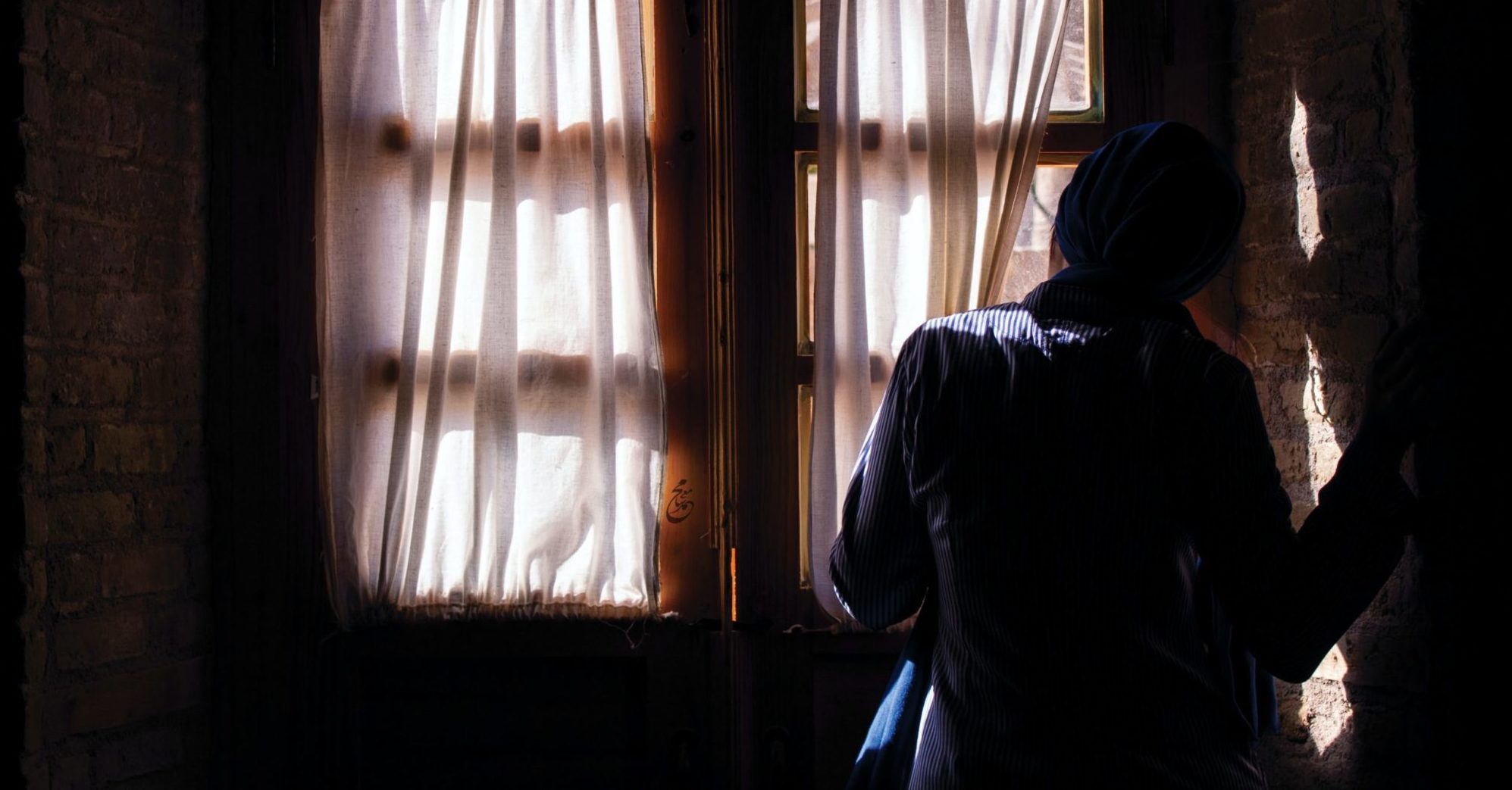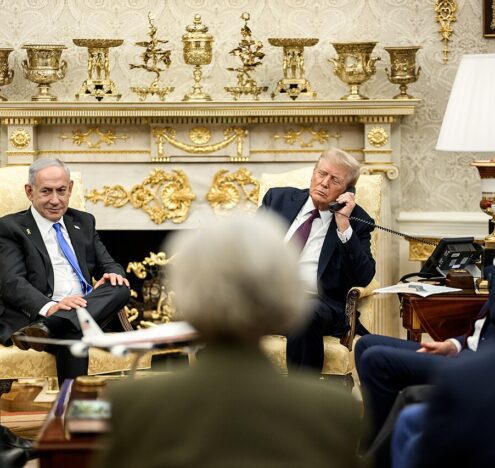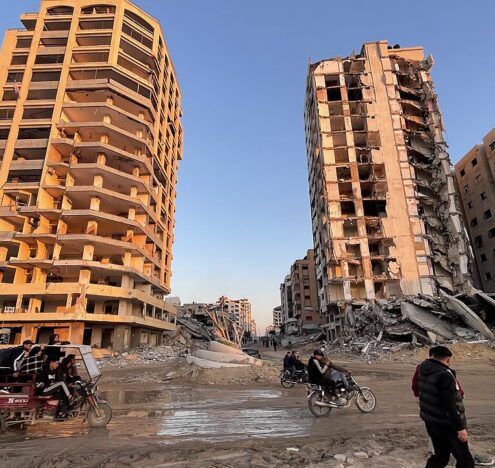On the eve of the Russian invasion of Ukraine, President Vladimir Putin gave a rambling, hour-long speech in which he claimed that Ukraine historically belonged to Russia and that his war would be a correction. Almost immediately after, Syria’s President Bashar al-Assad came out in full support of the action. A call between the two leaders resulted in a statement from Damascus that regurgitated the false narrative being pushed by Moscow: Ukraine’s independence was a historic mistake. Theirs is an unsurprising alliance, as Russia has politically and militarily backed Assad’s brutal campaign against the Syrian opposition since 2015. While the international community watches Ukraine with bated breath, those who have been monitoring Syria are not surprised by the crimes Russia is committing.
The horror unfolding now in Ukraine is both indiscriminate and illegal, but it is not unprecedented. For nearly the past decade Russian forces have exercised — and nearly perfected — the targeting of civilians and civilian infrastructure in Syria in support of Assad’s isolated regime. Their practices, which include the targeting of medical facilities, schools, and noncombatants, are illegal under international humanitarian law. For years the international community has failed to deter Russia’s actions in Syria, and now the Kremlin is doing it again in Ukraine.
THE SYRIAN EXPERIMENT
International humanitarian law has its roots in the post-World War II international treaties which sought to regulate the conduct of war and protect civilians, notably through the 1949 Geneva Conventions and subsequent Additional Protocols in 1977 and 2005. Together with a host of other conventions and protocols, these laws govern the treatment of the wounded, prisoners of war, and civilians during an armed conflict. These laws set boundaries on the conduct of war by assigning protected status to parts of the population and banning the use of certain weapons. In short, they are a framework for who can die in war and how they can die.
With its partner in Damascus, Russia is responsible for some of the most heinous crimes committed in the Syrian war, including the intentional targeting of hospitals and medical personnel. The UK-based Airwars has estimated that Russia is responsible for as many as 39,000 military strikes in Syria and for between 14,000 to 23,000 civilian deaths from 2015 to 2021. Nearly five thousand of those deaths belong to children. Even by conservative estimates, children could account for as many as 34% of Syrian civilian deaths as a result of Russian strikes.
Russia’s “double-tap strikes” are a particularly gruesome signature. After a first strike hits, a second attack follows shortly after, targeting first responders on the scene. Together, Russia and Syria are responsible for serious violations of the laws of war, including indiscriminate attacks on civilian infrastructure like schools and hospitals.
At barely a week old, Russia’s war is responsible for crimes similar to those committed in Syria, including the use of indiscriminate weapons and the targeting of civilians and civilian objects.
The 11-month long campaign by Russian and Syrian forces to recapture Idlib resulted in 46 documented air and ground attacks, which according to Human Rights Watch included cluster munitions targeting civilian infrastructure. These attacks, according to the organization, did not meet any military objectives and were deliberate, meaning they more than likely amount to war crimes. The offensive cost 1,600 civilian lives and displaced an estimated 1.4 million others.
From March 2011 to June 2021, Syrian and Russian forces were responsible for at least 600 attacks on medical facilities, according to the group Physicians for Human Rights (PHR). These attacks included the use of barrel bombs which, like cluster munitions, project objects (usually crude items such as nails or metal parts) indiscriminately. Although the UN Security Council demanded that their use be halted in Syria through Resolution 2139 in 2014, Assad and his Russian allies have continued to ignore this.
The laws of war are clear: The deliberate targeting of civilians and civilian infrastructure are illicit. But the targeting of civilians is a deliberate strategy to both weaken opposition morale and cause displacement, effectively clearing the way for the regime’s takeover. Similar reports from Amnesty International agree that the assault on Idlib, including attacks on hospitals, amounts to war crimes.
At the beginning of 2020, the UN Independent International Commission of Inquiry on the Syrian Arab Republic determined that the Russian Air Force was responsible for war crimes in Syria, related to an incident of indiscriminate attacks on civilians in August 2020 in southern Idlib. So far, Moscow has faced no serious consequences for its actions in Syria, and continues to play a major role in Assad’s violent campaign to retake the country.
UKRAINE TODAY
Now a similar tragedy is unfolding in Ukraine. At barely a week old, Russia’s war is responsible for crimes similar to those committed in Syria, including the use of indiscriminate weapons and the targeting of civilians and civilian objects. On Feb. 24, Russia deployed a cluster munition-loaded ballistic missile at a hospital in Vuhledar, killing four civilians and injuring six healthcare workers. The following day, the same weapon was used in Okhtyrka to target a preschool where civilians were taking shelter, killing three (including one child). These acts, according to Amnesty International, could constitute war crimes. Today a school in the eastern city of Kharkiv stands decimated, the result of one of many Russian missiles that landed on the city of 1.4 million.
There are reports that Ukrainian authorities are documenting evidence of alleged war crimes being committed in their own country, preparing to submit them to international tribunals. Though Ukraine is not party to the ICC, in 2015 Ukraine accepted the legal body’s jurisdiction regarding crimes committed in the state since the Russian invasion of Crimea in 2014. “After never being held accountable for its brutal and systematic targeting of health care workers and facilities in Syria, Russia is likely emboldened to attack hospitals and health workers in Ukraine,” warns Michele Heisler, MD, MPA, the Medical Director at Physicians for Human Rights.
The invasion of Ukraine is still unfolding and new violations will need to be documented and verified, but these incidents are some of many potential documented war crimes in this war — and more are likely to follow.
HOLDING RUSSIA TO ACCOUNT
On Feb. 26, 2022, the Ukrainian state filed an application calling for proceedings against Russia in the International Court of Justice, citing the 1948 Convention on the Prevention and Punishment of the Crime of Genocide (otherwise known as the Genocide Convention). The application both denies Russia’s false accusations of genocide being committed by Ukraine in Luhansk and Donetsk and accuses Moscow of “planning acts of genocide” in Ukraine.
There is no denying that the international community has taken a swifter, stronger reaction to Russia’s invasion of Ukraine than it has for the past decade of Syria’s bloody war. For example, on Monday, Feb. 28, the International Criminal Court opened an investigation into the Ukraine war, believing there to be sufficient evidence of war crimes and crimes against humanity being committed on the ground. Yet, so long as Russia remains on the UN Security Council, neither presidents Putin nor Assad will face trial for their crimes at the ICC, as its hands are tied with Russia’s veto. In a rare move, the UN General Assembly met for an Emergency Special Session, lifting hopes that the body will take stronger action to halt Russia’s aggression.
But Syrians watching this new crisis unfold know that justice, whether in the courts or through victory, is never guaranteed.
Tabitha H. Sanders is a London-based freelance journalist and master’s student at King’s College London.




















